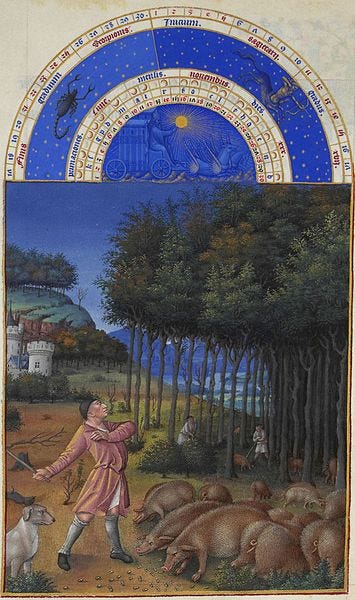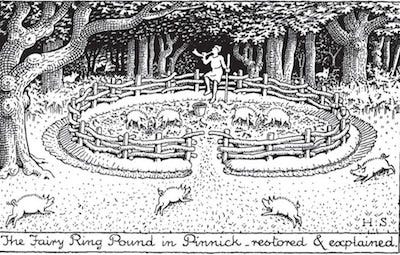Please Accept My Application To Be Turned Loose in The Royal Forest to Root for Beechmast and Acorns
Previously in this series: Please accept my application to become a bog body. Please accept my application to become the wealthiest peasant in the village.
Kindly turn me loose in the royal forest, to root for fallen acorns, sweet chestnuts and horse-chestnuts, hazelnuts and beechmast, until such time as I become suitably winter-fat.
A natural byproduct of the rooting process is the turning over and breaking of earth. This releases critical nutrients for continued tree growth and prevents soil compaction, thereby improving drainage.
It is a historic right and privilege of the common people to turn me loose for pannage. By turning me loose in the royal forest to root for beechmast, you ensure a continuity of tradition, social cohesion, and a unified group identity.
It is safe for me to eat green acorns, hickory nuts, et cetera, as a substantial part of my diet, whereas it is dangerous, sometimes even fatal, for cattle and ponies to do so.
By exercising my historical privilege and natural right to pannage, I can protect all commonly-held cattle and ponies for miles around.
I can eat so, so many acorns.
In 1968, over 80 ponies and 40 head of cattle died from acorn poisoning in the New Forest. This is an unacceptable loss of life, and were I to be turned loose in the New Forest to snuffle around in the dirt, happily eating whatever roots and nuts and so on turned up under my hooves, I could save dozens of ponies.
These ponies could be used for plowing, winnowing, threshing, long journeys to market, pilgrimage, et cetera. The village would actually become more productive, not less, if I were turned out into the royal forest for at least 60 days to exercise my right to common of Mast.
I would be very good, and I would have so much fun safeguarding a viable future for forest-commoning.
The marking fee for pigs on the forest, according to the Atlas of Rights of the Verderers of the New Forest, is only £4.00.
This is not very much money at all.
Consider that if I were to eat up to 20 pounds of acorns a day — which is not at all difficult for me — for 60 days, the marking fee would amortize out to less than £0.00001 per acorn.
That is almost no money, and so many acorns.
Rooting is an instinctual behavior. It is not learned. I already know how to do it.
It is characterized by nudging or pushing the snout into something, and is considered both comforting and useful.
Also, you will not have to buy any feed during my 60 days in the forest. This will save you even more money.
It is so nice in the forest. There is such shade, from the trees. There is such water, from the brook. There is such soil, from the earth. There is such quiet, from the roots. It is so good for me to be there. At the center of a deep cool peace, put a pig.
I will return very orderly and in good time home to go to bed at night, no matter how far I wander during the day, even upwards of five miles of our holding.
Some animals, for example a squirrel, cache their acorns. Not me. I find an acorn, I eat an acorn. You will know exactly what you are getting (the eating of acorns) from your most straightforward friend, the pig.
A pig is a very important part of an oak tree’s business. It will be a good idea and you will be so glad you did it. You should go ahead and turn me loose right now. There is no need for a gate between me and the trees. Okay!





That felt good! And I love the fairy ring pound. PS also loved hearing you interviewed here in Aotearoa with Kim Hill. You are a good man Daniel Lavery. And good surname associations, I come from Lavertys who kept a 't' in there, but the celtic name origins are closer to O'Flaherty. But I digress. More rooting!
Love this!